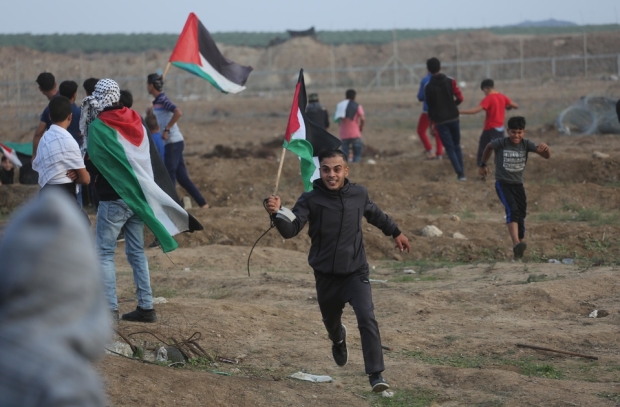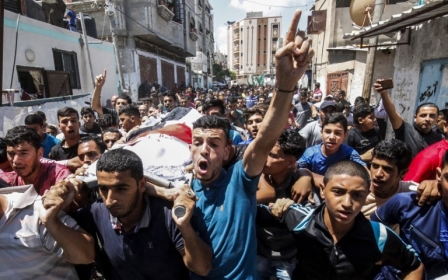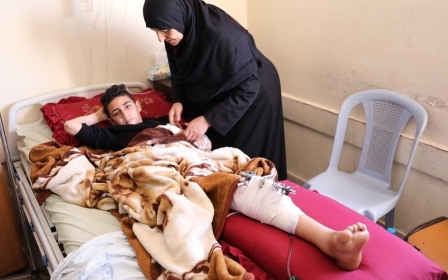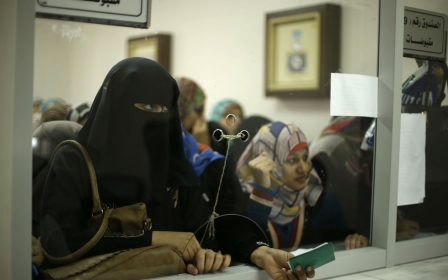Palestinians in Gaza vow to continue protesting despite Qatar's financial aid
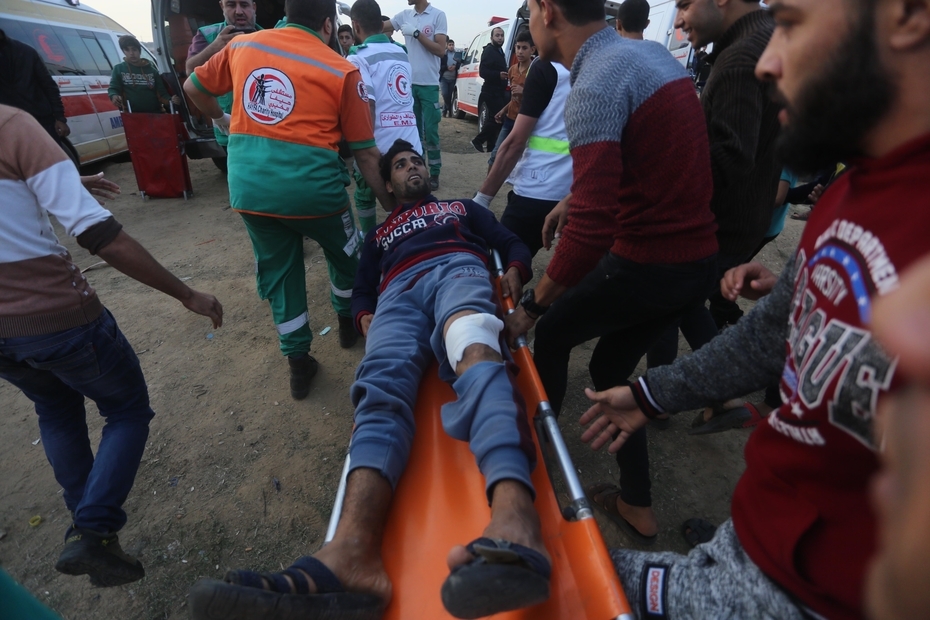
GAZA CITY, Gaza – Thousands of Palestinians marched across the Gaza Strip on Friday, while hundreds of civil servants waited in queues for their Qatari-funded salaries, which were delivered as part of an effort to ease the growing humanitarian crisis in the blockaded enclave.
The Gaza health ministry said that one Palestinian was killed and at least 30 others were hurt when Israeli forces shot live ammunition during Friday protests across the blockaded territory, with women, children, and a journalist among the injured.
Rami Qahman, 28, died after being shot east of Rafah in southern Gaza, the ministry said.
Qatar announced that a first $15m instalment - out of a $90m total payout - would be delivered on Friday and go to paying the salaries of employees working for the Hamas-led authorities in Gaza.
In late October, Israel and Qatar reached an agreement for Doha to send funds to pay Gaza's civil servants, who hadn't been paid since September 2013.
The unpaid wages have been a major point of contention between the West Bank-based Palestinian Authority and Hamas, which took control of Gaza in 2007. Reuters reported that many people have accused the PA of using the salaries as a means of exerting pressure on the already impoverished Gaza Strip.
The Qatari funds also went to pay for emergency fuel supplies, which are expected to increase the number of hours of electricity available in Gaza from four to nearly 10 per day.
Qatar’s ambassador to Gaza, Mohammed al-Emadi, visited the “return tents" set up near the Gaza-Israel fence in the eastern part of the territory, to keep track of the situation during the protests.
Palestinians in the Gaza Strip have been protesting every Friday since 30 March to demand the right to return to their ancestral villages.
But while Palestinians told Middle East Eye they were grateful for the Qatari aid, many said that Doha’s help would not bring back their homeland.
Reda al-Banna, a protester in Gaza, said that no “financial aid could restore” the land that was taken “forcibly from the Palestinians”.
“We appreciate Qatar’s attempts to alleviate our suffering. After all, an Arab country has finally done something instead of just watching us die, but we still have not received any of the things we lost in our original homeland,” Banna told MEE.
“Even if the blockade were lifted, we will continue to protest until we get our right to return. My family and I have been attending these protests since 30 March and we will not stop now just because some have received part of their economic rights.”
We appreciate Qatar’s attempts to alleviate our suffering ... but we still have not received any of the things we lost in our original homeland
- Reda al-Banna, protestor in Gaza
Mohammed Haniyya, a Gazan civil servant who received part of his salary thanks to the Qatari funds, told MEE he would continue to participate in the protests because “donations are not enough to silence our voices”.
“I have received half of my salary today, and while this will ease my family’s poor financial situation for some time, I will continue to protest until the blockade is completely lifted and the Palestinians' refugee plight is solved,” he said.
“We have been living under blockade for more than 12 years now and we are willing to continue the protests for the next 12 years.”
Haniyya, who was previously injured in his right leg during the marches, said he joined the protests for “moral rather than economic” reasons.
“I have never protested to just get better living conditions or to regularly receive my salary," he said. “These are important (things), but my goal was to restore what our grandfathers lost: our right to live in dignity.”
In July 2017, a United Nations report found that the living conditions of Gaza's nearly two million residents - including 1.3 million refugees - were declining at a dramatic rate, with Gaza set to become "unlivable" by 2020.
Earlier this month, there were reports that Hamas and Israel had reached an agreement for Israel to lift 70 percent of the blockade on Gaza and expand the fishing zone off the Gazan coast from six to 14 nautical miles.
But Gaza resident and protest participant Salah Abu Jaber told MEE that easing the restrictions on Palestinian fishermen and paying civil servant salaries would not stop the protests.
“We will continue even if we receive 100 percent of our salaries,” Abu Jaber said.
“My family did not expect me to bring them money by participating in the protests; they expect me to fight for their right to a better life in their original homeland,” he continued.
“It is true that the last year was the harshest since Israel has imposed the blockade, but what we are looking for is a solution to our crisis - not temporary aid.”
Doha Jihad, a 26-year-old school teacher, said her students are relieved their parents will finally receive part of their salaries and meet some of their long-awaited needs.
“There is no doubt that this is a good step forward, especially after more a decade during which children have been traumatised by war and suffocating restrictions on every aspect of their lives,” she said.
“We cannot deny that we have been waiting for the international community to do something to address our humanitarian crisis, but this is something we need only to stay alive, not to put an end to the occupation.”
New MEE newsletter: Jerusalem Dispatch
Sign up to get the latest insights and analysis on Israel-Palestine, alongside Turkey Unpacked and other MEE newsletters
Middle East Eye delivers independent and unrivalled coverage and analysis of the Middle East, North Africa and beyond. To learn more about republishing this content and the associated fees, please fill out this form. More about MEE can be found here.



